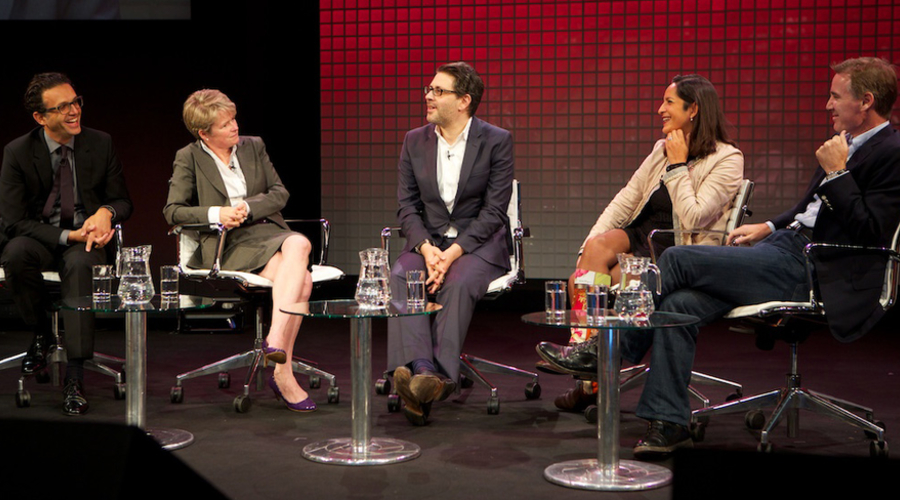In the final session – traditionally, the stage for the CEOs of the major UK television players to air their concerns – four up-and-coming stars joined the conversation.
The Next Generation Leaders were each nominated by their current CEOs, and all work in production companies: Ben Cavey, head of comedy and entertainment at Tiger Aspect; Lucinda Hicks, COO at Dragonfly; Patrick Holland, MD of Boundless; and Dan Jones, creative director, digital at Maverick.
Session chair Matt Frei started by asking BBC director of television Danny Cohen whether the BBC was too averse to taking creative risks.
Cohen insisted that the corporation is “taking two kinds of risk now: we’re taking creative risks about content and we are taking [technical] risks with platforms and the release of content [such as releasing some programmes on iPlayer before linear transmission].”
Cavey asked whether an obsession with ratings is stifling the BBC’s creative success. “I don’t believe in making programmes that people don’t watch,” said Cohen, who went on to argue that the BBC paid as much attention to a show’s Appreciation Index as to its overnights, and now also uses a “Fresh and New” metric “to see if we are making stuff that feels risk taking and distinctive enough”.
Frei’s next target was ITV’s business model – can it last?
“It is not about taking sides,” replied Adam Crozier. “[In other industries people are] used to having lots of relationships with the same people – as colleagues, rivals here, in a joint venture over there, as suppliers. TV is just growing up and getting used to operating in the same way as many other businesses do.”
He went on: “We have to embrace risk. It’s the only way you get very high-quality programmes.
“We were too reliant on ad revenue in one country. We are rebalancing the business… we are now in digital, in pay-TV, we are among the top five independent producers in the US.
“It’s fascinating to look at the debate around Hulu, at whether these new platforms are friend or foe. Of course, they are both.
“Even the owners of Hulu did not sell their best content to the platform they owned – because they couldn’t work out whether it was a good thing or a bad thing to do.”
Channel 4’s new Growth Fund was next in the spotlight.
CEO David Abraham said he expected to invest in “a reasonable number of companies. Our remit encourages us to take risks and to work with lots of companies around the country.
“We are thinking of [taking minority stakes] in companies turning over say £1m-£2m and taking them to £8m-£10m, where groups such as Freemantle might think of buying them.”
All3Media’s CEO, Farah Ramzan Golant, who was also on the platform, welcomed the initiative: “Any such investment enhances broadcasters’ understanding of the market.”
As for where she herself would invest, Golant said that if her board supported the idea, “I would definitely stick some money into what Nancy Tellem is doing with Microsoft.”
Dido Harding made it clear that her company, TalkTalk, does not fit neatly into any of the categories of broadcaster, platform or creator.
“I’m not a platform person. Two years ago came here I felt like a plumber in a land of poets, and even more so today,” she said. “I run a telco that provides digital connectivity into people’s homes… and I’m a shareholder in a platform, YouView. I give my customers YouView for free – so if I was a platform business, I’d be a very bad one.”
She added: “The reason YouView is growing so fast is the user interface is simple… The winning platform will be the platform that does curation best, because this explosion of content makes it hard for viewers to navigate it all.”
Harding also noted that, “Not one of us in this room is a digital native. We are all learning to interact with audiences.”
When Frei moved the debate onto what constitutes leadership in this fast-changing environment, Golant made the point that the fundamentals do not change: “Quality content, talented people being given some freedom and space with parameters and accountability… We do not grow companies: we grow people who grow companies…”
However, “[we want] to give people the space to fail – but we are not structured for failure. We don’t know how to manage it – that is something for future leaders.”
The session was produced by Rebecca de Young and Sue Brody.
Report by Gordon Jamieson. Photo by Paul Hampartsoumian.

